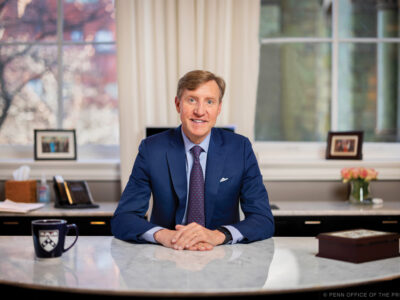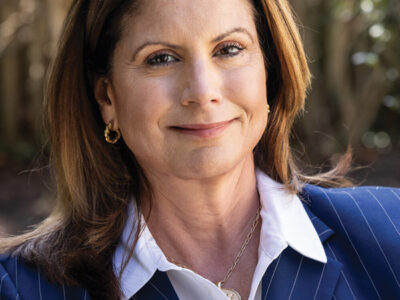The University will gain a new provost next month: Dr. Robert Barchi, Gr’72, M’73, the David Mahoney Professor of Neurological Sciences who has served as chair of the Departments of Neuroscience and Neurology at Penn’s School of Medicine. The 52-year-old scientist, a member of the faculty since 1974, will step into his new role on February 1, succeeding Dr. Stanley Chodorow, who resigned at the end of 1997 to seek a university presidency. Dr. Michael Wachter, who had served as interim provost since Chodorow’s departure, has returned full-time to his previous posts as the William B. Johnson Professor of Law and Economics and director of the Institute for Law and Economics.
Barchi,
a member of the Institute of Medicine of the National Academy of Sciences,
where he has served as section chair for neuroscience, was hailed by Dr.
Judith Rodin, CW’66, president of the University, as an “extraordinary
scientist and scholar who has become one of Penn’s true luminaries in
his quarter- century” at the University.
“He is a deeply respected faculty leader who has
been at the forefront of the design and implementation of important multi-disciplinary
advances in teaching and research,” Rodin added. “I am truly
delighted that someone who has so distinguished himself as an internationally-renowned
scholar is eager to take on the challenge of Penn’s academic leadership.”
Rodin praised the search committee of faculty and students for having
“considered so carefully the extraordinary academic leadership we
have here at Penn in its international search to find just the right person
to be the University’s new provost.” (She was also effusive in her
praise of Wachter, saying that she had “known no provost here or
anywhere who has had a better grasp of the complex realities of academic
planning and budgeting.”)
For his part, Barchi said the provost’s job wasn’t something
that he had been “actively looking for,” but added: “I’ve
been around the University for a very long time and I feel very deeply
committed to the University and its academic mission and its academic
goals. What I see here is a tremendous challenge and a tremendous opportunity
for me to help move this institution forward and interact with faculty
and students who are among the best in the world.”
Barchi, who received his undergraduate degree from Georgetown
University in 1968 before earning both his Ph.D. in biochemistry and his
medical degree from Penn, wouldn’t yet zero in on his objectives for the
job, noting: “I’m just starting to do my rounds of talking to everybody,
and I don’t want to come out with a list of specific goals until I’ve
had a chance to validate them with the leadership of all the schools in
the University, and with the faculty and students. I think the job of
provost is to be the leader of the academic community. That means consultation.
That means representation. That means bringing programs up as well as
pushing them down. I think it would be taking the wrong step to say, ‘These
are my goals,’ when what these really are are the faculty goals,
the president’s goals, the students’ goals — an interpretation of where
this institution wants to go.”
That said, Barchi added, “I [want to] keep this
as one of the premier academic institutions in the world as we move into
the 21st century. There are a lot of pressures on academic institutions,
financial and time-wise, that are changing the ways we teach and learn.
We have to [lead] in making those changes … I’m sure I’ll be doing a
lot of work with students and faculty to find out where we need to go,
how to create innovative programs to get there, and how to take advantage
of the incredible resources we have at Penn.”
Barchi also hopes to work on improving the linkage of
programs and people across the University. “I think we have an incredible
amount of resources and talent,” he said. “We just need to make
sure that they’re arrayed in a way that’s accessible to students and each
other.”
Barchi said he hopes to model himself after predecessors
such as Dr. Jonathan Rhoads, GrM’40, Hon’60, and the late Dr. Eliot
Stellar, who “were outstanding academic leaders and, incidentally,
went back to the faculty. One of the things that concerns students is,
‘Are you going to be looking for a [university] presidency?’ That’s not
why I’m interested in doing this job. That’s not even on my radar screen.”
Barchi is the author of some 150 publications, and his
research has focused on the voltage-dependent sodium channels that generate
action potentials in nerve and muscle cells and, most recently, has explored
the relationship between molecular structure and function in the skeletal-muscle
sodium channel. While noting last month that he planned to step down as
chair of the neurology and neuroscience departments, Barchi will keep
serving as the Mahoney professor. He will also continue to see some patients,
though he made it clear that he intends to focus his attention on the
job of provost.
A Daily Pennsylvanian editorial commenting on
the provost’s selection said, “Barchi seems open to many views and
ideas, as well as being eager to develop a consultation and decision-making
process that incorporates students and faculty to a greater extent. His
stated goal of bridging gaps — between schools, disciplines, and education
levels — is a big part of what the University needs.” The DP
called on Barchi to continue strengthening the School of Arts and
Sciences, and to revamp the University’s tenure process as well as its
general course-requirement system.




